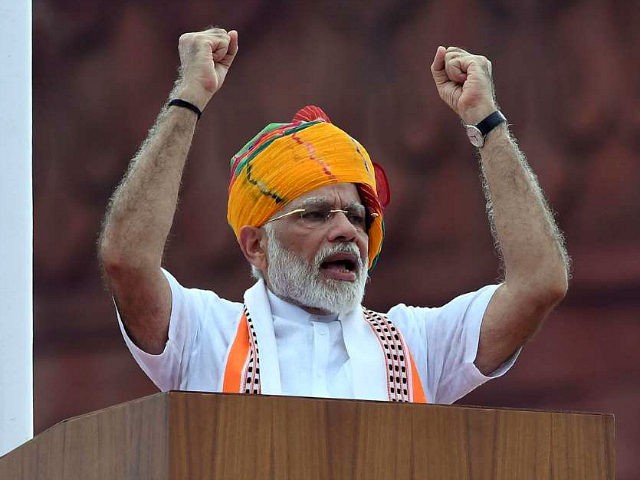India’s Hindu-nationalist Prime Minister Narendra Modi on Thursday hailed his decision to revoke New Delhi-administered Kashmir of its autonomy last week as “path-breaking.”
Modi’s comments came during a speech marking Indian Independence Day.
In sharp contrast, Pakistani Prime Minister Imran Khan lambasted New Delhi over its Kashmir move, comparing Modi’s party to Nazis and accusing India of an “ethnic cleansing” ploy targeting Muslims. Indian-held Kashmir is India’s only predominantly Muslim region.
Khan made his accusations against India during a speech in Pakistani Kashmir on Wednesday — Pakistan’s Independence Day.
Indian Kashmir is broken down into three regions: Kashmir, Jammu, and Ladakh, which India considers to cover part of Chinese Kashmir.
According to the Press Trust of India (PTI), PM Modi declared on Thursday:
It has been under ten weeks since the new government was formed, but several path-breaking decisions have been taken. This includes decisions for Jammu, Kashmir, [and] Ladakh. … The work did not happen in 70 years, the task of removing Article 70 [Kashmir’s autonomy] … was accomplished in 70 days and both houses of parliament passed it with two-third majority.
…
It is our responsibility to fulfill the hopes and aspirations of the people of Jammu and Kashmir and help provide them new wings. … It is “India First” for us. Politics comes and goes, but steps in the interest of the nation are paramount.
India’s ruling Hindu nationalist party has long promised the revocation of New Delhi-held Kashmir’s autonomy. Modi and his Bharatiya Janata Party (BJP) won a landslide victory during the Indian elections this year.
The PM and the BJP believe the changes in Indian Kashmir will bring stability to the volatile region, fight corruption, and improve economic conditions.
On Thursday, the Associated Press (AP) reported that Indians “love” Modi for the action he took in Kashmir, adding:
The achingly beautiful Himalayan valley was flooded with soldiers and roadblocks of razor wire. Phone lines were cut, internet connections switched off, politicians arrested. Public gatherings were banned.
The prime minister of the world’s largest democracy had clamped down on Kashmir to near-totalitarian levels. And Narendra Modi’s country reacted with roaring approval: As he had Kashmir stripped of statehood and its special constitutional status, even some of his political opponents were calling out support.
Modi, a Hindu nationalist by the time he was 10 years old, had upended life in India’s only Muslim-majority state, flexing those nationalist muscles for his millions of followers.
Modi implemented the security lockdown in Indian Kashmir on August 4, soon before New Delhi stripped the region of its limited autonomy. Some news reports suggested the lockdown, intended to avert public uprisings over India’s decision, would last through Thursday. However, Al Jazeera reported Thursday that New Delhi lifted the lockdown and communication blackout from the Hindu-majority portion of Indian Kashmir. However, the restrictions continue in the predominantly Indian Kashmir territory.
“Restrictions imposed in Jammu have been completely removed and schools and other establishments there are functioning,” Munir Khan, a local police officer, reportedly told Indian media on Thursday.
“Restrictions will continue in some places of Kashmir for some time,” he added.
So far, Indian authorities in Kashmir have reportedly detained 1,300 people in their homes as part of New Delhi’s crackdown, the Independent reported. Among the detainees are 350 politicians under house arrest.
India reportedly arrested “the entire leadership of all the region’s pro-India parties, including three former chief ministers,” the Independent revealed, referring to the move as unprecedented.
The U.S. government and human rights groups have recently accused India’s ruling Hindu nationalist party of inciting hatred against Muslims. India denies the accusations.
Islamabad has long accused India of human rights violations against separatists seeking independence or a merger with Pakistan. India, on the other hand, blames Pakistan of backing Islamic terrorist groups in the region.
India, Pakistan, and China all have competing claims to Kashmir. Although Pakistan and India claim ownership of the entire region, a border separates it between the two nuclear-armed rivals. While Pakistan has ceded control of some of its territories to China, India disputes Beijing’s claims to land on its side of the Kashmir border.
Last week, New Delhi revoked Indian Kashmir’s autonomy and broke the region into two federally administered areas. Part of Chinese Kashmir sits in one of those two regions administered by India’s central government
China has deemed the move a violation of its sovereignty.
New Delhi, however, claims it has no interested in annexing part of Chinese Kashmir despite comments to the contrary by at least one Indian official.

COMMENTS
Please let us know if you're having issues with commenting.